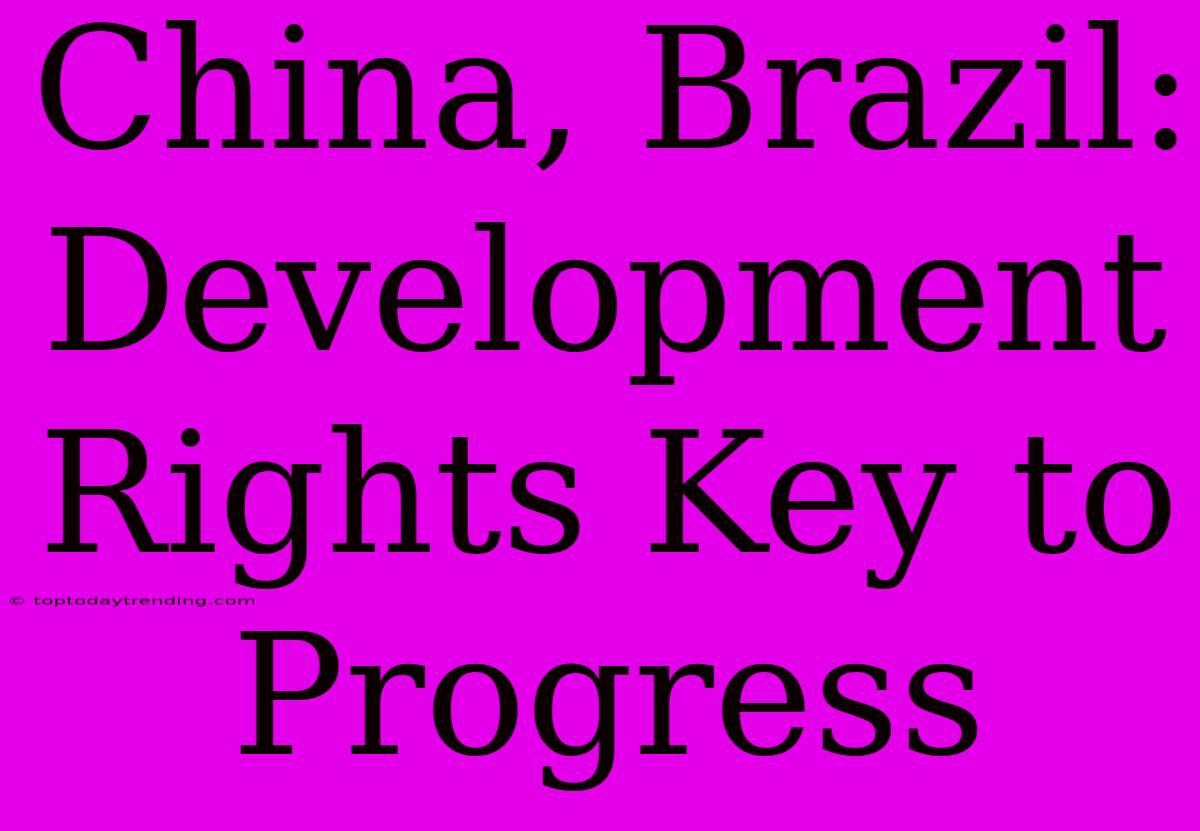China, Brazil: Development Rights Key to Progress
China and Brazil, two of the world's largest developing economies, are facing similar challenges in their quest for sustained economic growth and prosperity. Both countries possess vast natural resources, a young and growing population, and a strong desire to improve the lives of their citizens. However, they also grapple with issues of inequality, environmental degradation, and political instability. As they navigate these complexities, securing the right to development emerges as a critical factor for their progress.
The Development Rights Framework
The concept of development rights encompasses a country's ability to pursue its own development path, free from undue external interference. This framework recognizes the right of nations to utilize their resources, pursue their own economic and social policies, and benefit from the fruits of their development efforts.
For both China and Brazil, development rights are crucial for several reasons:
- Self-determination: It allows them to prioritize their own needs and priorities, rather than being dictated by external forces.
- Economic Independence: It enables them to build strong economies and reduce reliance on foreign aid or investments, fostering self-reliance.
- Environmental Sustainability: It empowers them to manage their resources sustainably and protect their environment, balancing economic growth with ecological considerations.
- Social Justice: It allows them to address inequality and poverty within their societies, ensuring that the benefits of development reach all citizens.
China's Development Trajectory
China's remarkable economic transformation over the past few decades has been fueled by its commitment to development rights. The country has aggressively pursued industrialization, invested in infrastructure, and adopted policies that prioritize economic growth. This approach has lifted millions out of poverty and made China a global economic powerhouse.
However, China's rapid growth has also come at a cost:
- Environmental damage: Extensive industrialization has led to severe air and water pollution, threatening the health of its citizens and ecosystems.
- Inequality: While poverty has declined significantly, income disparities persist, creating social tensions and undermining social cohesion.
- Political repression: China's authoritarian government has restricted freedom of expression and assembly, stifling dissent and hindering democratic development.
Moving forward, China needs to balance economic growth with environmental sustainability and social justice. This requires a shift towards a more inclusive and sustainable development model that prioritizes the well-being of its citizens and the health of the planet.
Brazil's Development Challenges
Brazil, with its abundant natural resources and a large population, holds immense potential for development. However, the country has faced several challenges in realizing its full potential:
- Corruption and political instability: Corruption has plagued Brazil's political system, hindering efficient governance and impeding progress on important development issues.
- Inequality: Brazil remains one of the most unequal countries in the world, with significant disparities in income, access to healthcare, and education.
- Environmental concerns: Deforestation, unsustainable agriculture, and mining practices have caused widespread environmental damage, jeopardizing biodiversity and ecosystem services.
Brazil needs to address these challenges effectively to unlock its development potential. This requires tackling corruption, promoting social inclusion, and implementing sustainable environmental practices.
Building a Shared Future
Both China and Brazil are at critical junctures in their development journeys. While they have achieved significant progress, they face challenges that require a new approach.
To ensure sustainable and inclusive progress, China and Brazil must:
- Strengthen their commitment to development rights: They must assert their right to pursue their own development paths, free from undue external pressure.
- Prioritize environmental sustainability: They must integrate environmental considerations into their development strategies, protecting their natural resources for future generations.
- Promote social justice: They must address inequalities within their societies, ensuring that the benefits of development reach all citizens.
By embracing a holistic and inclusive development approach, both China and Brazil can create a future where their citizens enjoy prosperity, security, and a healthy environment. This requires a shared commitment to development rights, environmental protection, and social justice. Only then can they truly unlock their potential and build a better future for all.

